Understanding the Relationship
Addiction and self-esteem are deeply intertwined, creating a complex dynamic that significantly impacts an individual’s self-worth and recovery trajectory. At the heart of this relationship lies self-esteem, a vital component influencing how individuals perceive themselves and their abilities. This article delves into how addiction alters self-perception, exploring psychological effects, the role of stigma, and strategies for rebuilding self-esteem during recovery, all backed by research findings.
The Cycle of Addiction and Self-Esteem
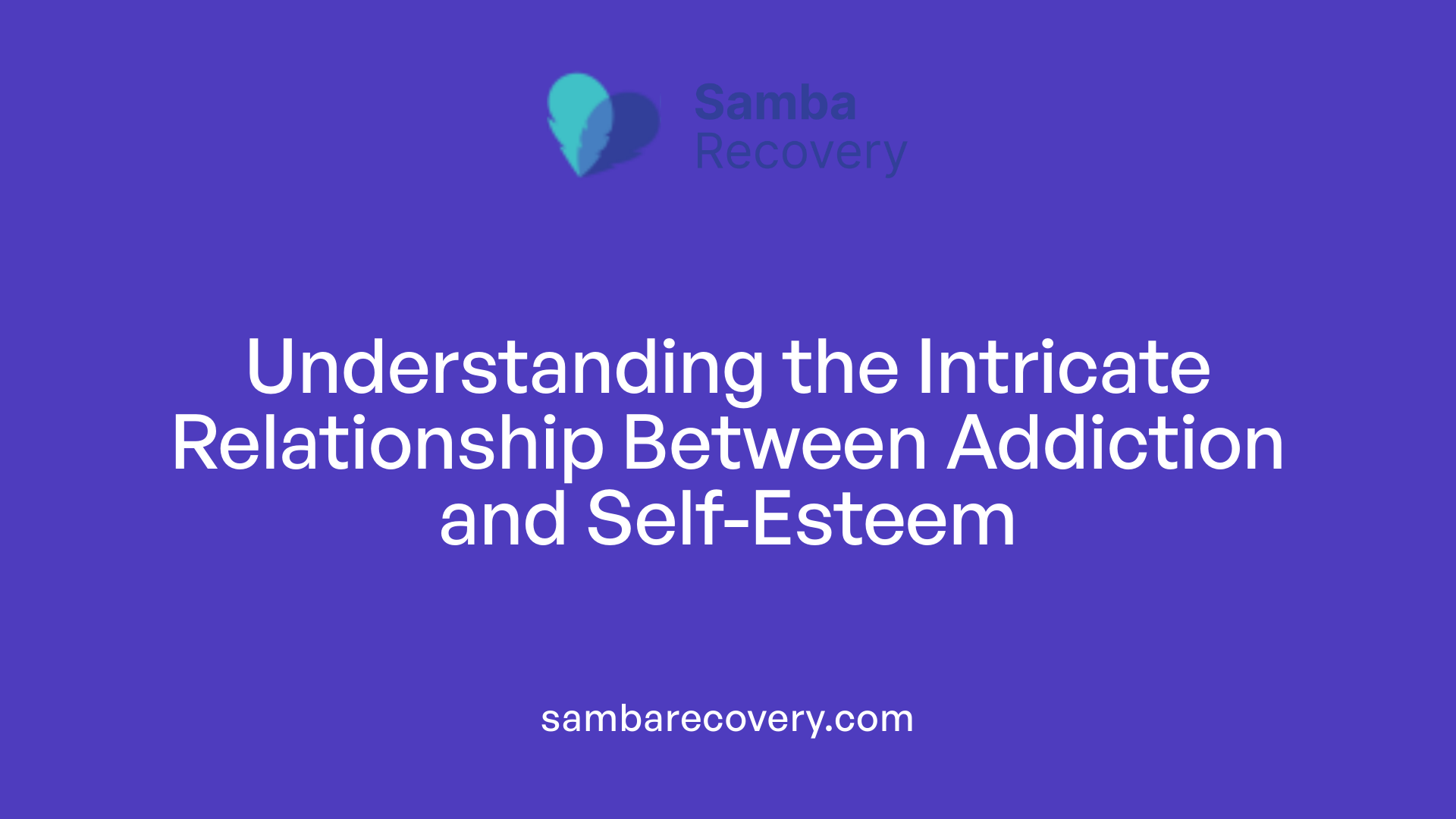
What is the relationship between addiction and self-esteem?
Addiction and self-esteem are interlinked in a cyclical manner. Low self-esteem can make individuals more vulnerable to developing addictive behaviors as a way to cope with feelings of inadequacy. Research shows that those struggling with addiction often exhibit lower self-esteem compared to those without such issues, indicating a strong correlation.
Furthermore, the consequences of addiction can further damage self-esteem, leading to feelings of guilt and shame, which complicate recovery efforts. Individuals facing substance use disorders frequently internalize negative self-perceptions rooted in their addiction. This emotional turmoil exacerbates their struggle with self-worth, reinforcing the belief that they are flawed or unworthy.
Enhancing self-esteem is essential in the recovery process. Higher self-worth is associated with healthier coping mechanisms and better life choices. Addressing self-esteem through therapy and positive affirmations can play a crucial role in breaking the cycle of addiction. By rebuilding self-worth, individuals are more likely to develop resilience against the temptations of drugs and alcohol, ultimately leading to more successful recovery outcomes.
Overall, the interplay of addiction and self-esteem highlights the need for integrated therapeutic approaches that focus on improving self-perception in conjunction with treating substance use issues.
Psychological Impact on Self-Worth
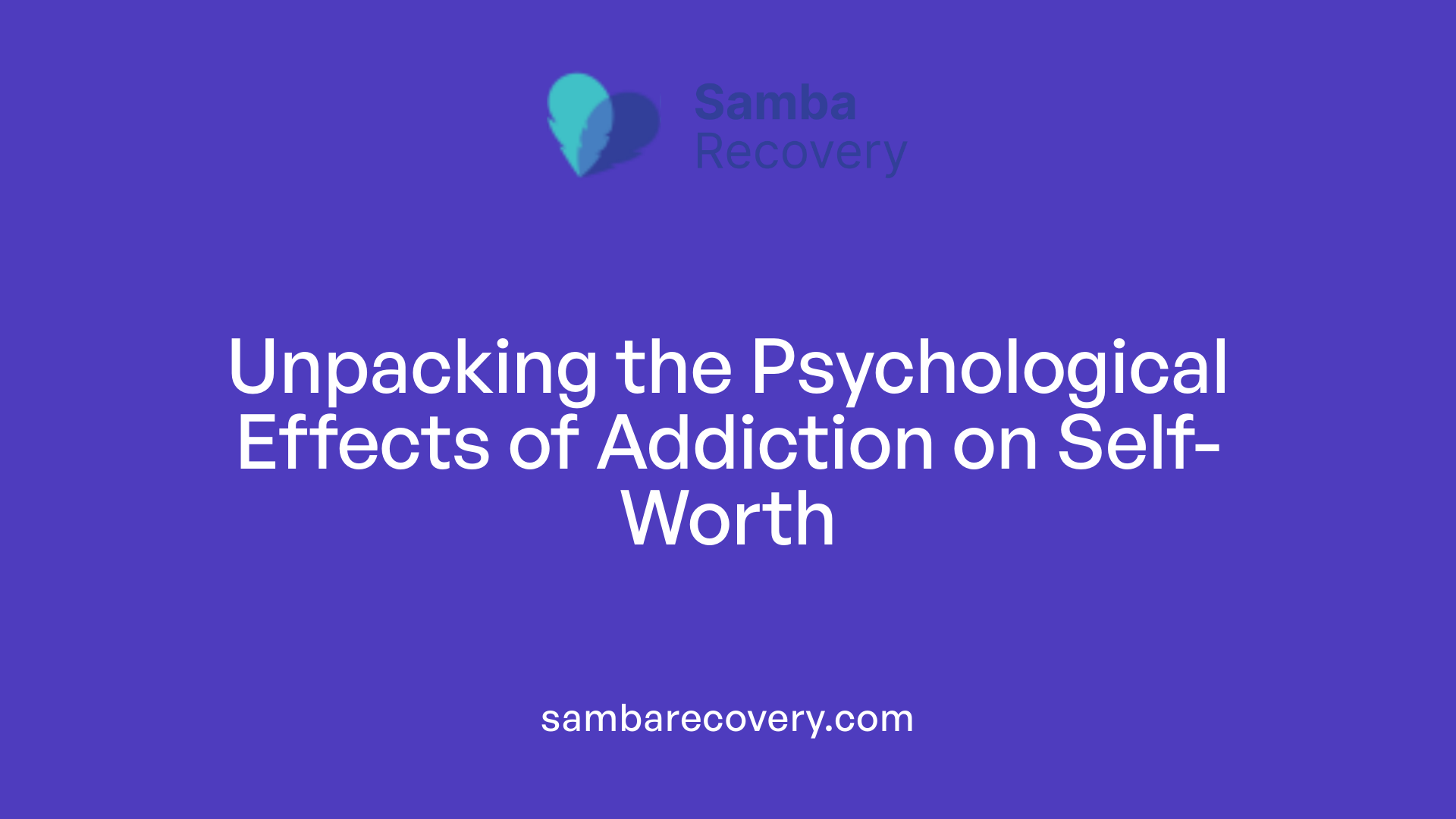
How do psychological effects of addiction impact self-worth?
The psychological effects of addiction profoundly impact self-worth by fostering feelings of guilt, shame, and inadequacy. Individuals struggling with addiction often have a history of low self-esteem, which can stem from childhood trauma and can worsen through the cycle of addiction.
- Distorted Self-Perception: Those with addiction issues frequently develop a negative view of themselves rooted in their experiences. Low self-worth can lead to feelings of unworthiness, prompting individuals to engage in destructive behaviors, including substance abuse, as a means of coping with their perceived deficiencies.
- Cycle of Guilt and Shame: Addiction not only brings about feelings of guilt over past mistakes but also perpetuates shame. The stigma and societal judgment surrounding substance use disorders contribute to these negative emotions, reinforcing a harmful self-image.
- Temporary Relief with Long-Term Consequences: The use of substances may initially provide a temporary escape or a false sense of confidence. However, as addiction exacerbates personal crises, individuals often find themselves caught in a cycle of worsening self-esteem and deeper isolation. This further damages their relationships and overall well-being.
Recovery programs emphasize the importance of rebuilding self-esteem through therapy and supportive networks, recognizing that high self-worth can significantly reduce the likelihood of substance abuse.
Thus, addressing self-esteem is crucial in both preventing addiction and aiding recovery, as it helps individuals break free from the vicious cycle of addiction and low self-worth.
Low Self-Esteem as a Precursor to Addiction
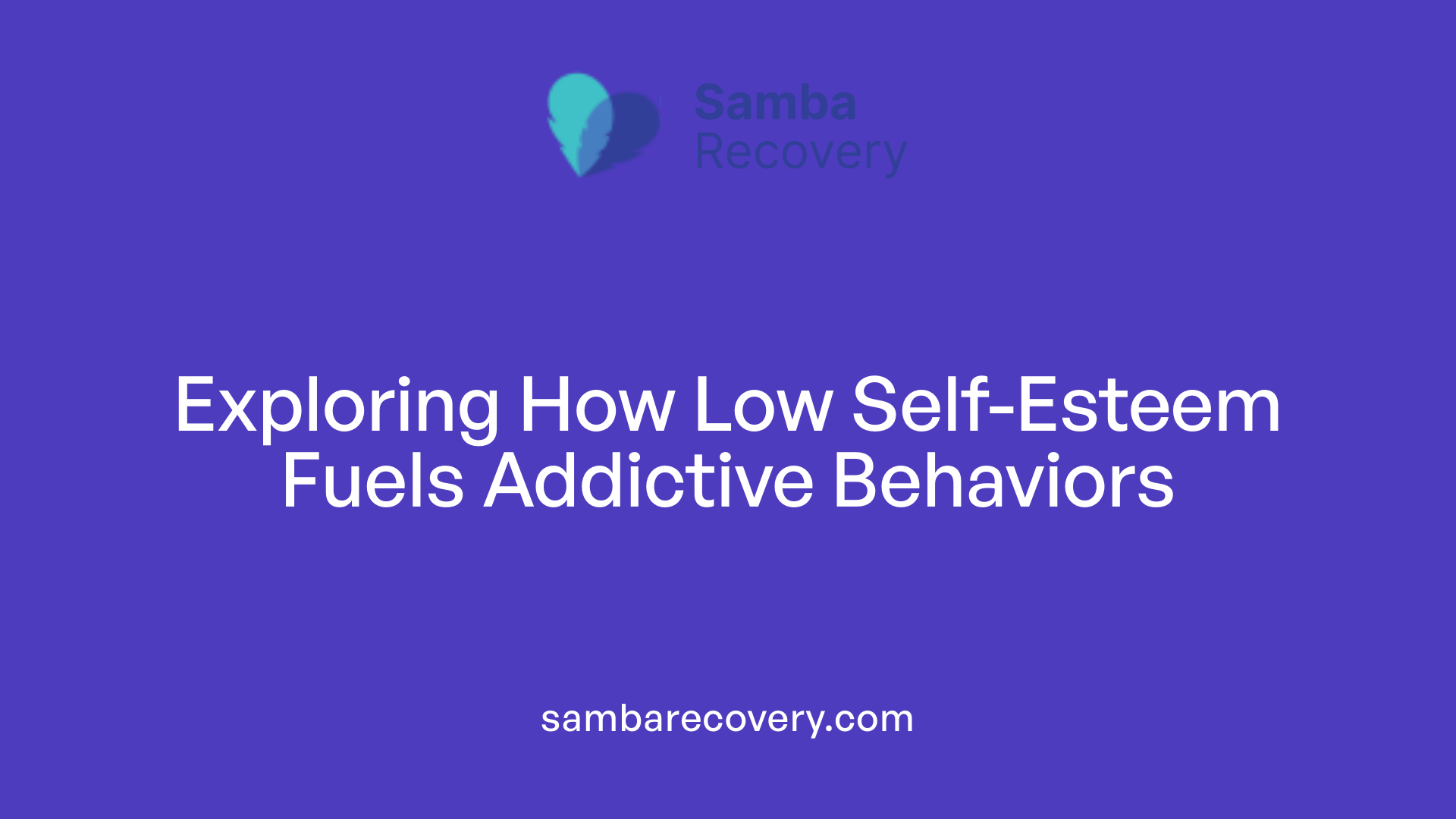
How does low self-esteem contribute to addictive behaviors?
Low self-esteem is often a precursor to addiction, as it fosters feelings of inadequacy and unworthiness. Individuals experiencing low self-worth may turn to substances as a way to cope with these intense negative feelings. This reliance on drugs or alcohol can create a temporary escape, offering fleeting relief from self-doubt and social anxiety. However, this coping mechanism leads to a harmful cycle—while substances may initially alleviate feelings of inadequacy, they ultimately contribute to a decline in self-image, resulting in greater feelings of guilt and unworthiness over time.
This cycle is particularly apparent among adolescents, who are more vulnerable to peer pressure and may resort to substance use as a means of gaining social acceptance. Studies show that many teenagers with low self-esteem engage in risky behaviors such as drug and alcohol use, hoping to project confidence that they feel internally lacking. Their addiction can become a self-sabotaging way to deal with feelings of shame and depression, making recovery challenging.
Impacts of early childhood experiences
The foundation of self-esteem often develops during early childhood. Adverse experiences—like trauma, neglect, or bullying—can significantly impact a child’s self-worth, laying the groundwork for potential substance use in later years. Research from the Adverse Childhood Experiences (ACE) study demonstrates a strong correlation between negative childhood events and subsequent addictive behaviors.
When children do not develop a secure sense of self, they may internalize feelings of worthlessness, leading to maladaptive coping strategies, including substance use. Therefore, addressing self-esteem issues through intervention and therapeutic support for those with addiction is crucial for breaking this cycle and promoting lasting recovery.
Stigma’s Detrimental Effects on Self-Esteem
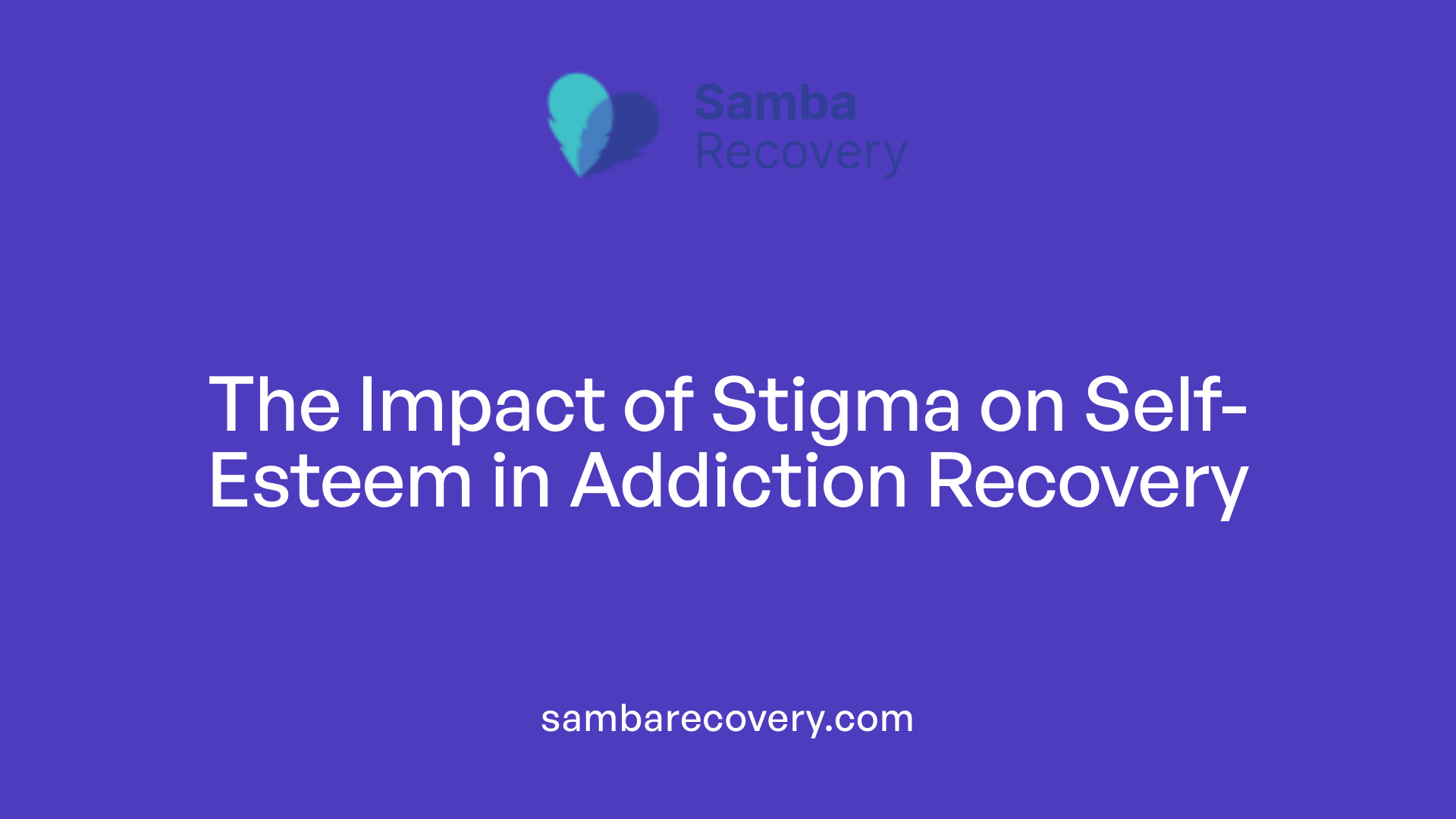
How does stigma associated with addiction affect self-esteem?
The stigma attached to addiction can deeply undermine self-esteem. Individuals facing addiction often internalize negative societal attitudes, leading to feelings of shame and unworthiness. This internalized stigma creates a damaging cycle that discourages seeking help, as individuals fear judgment and discrimination, which further pushes them into isolation.
The repercussions of stigma are significant, with many individuals reporting feelings of self-loathing connected to their substance use. Qualitative studies show that this self-perception exacerbates mental health challenges, creating barriers to recovery. Individuals may withdraw from social interactions, retreating further into harmful behaviors that diminish their self-worth.
In essence, the interplay of stigma and low self-esteem can have a profound effect on recovery journeys. It complicates individuals’ ability to heal, reinforcing negative emotions and hindering progress. Recovery programs that address these stigma-related issues can foster a more supportive environment, promoting a healthier self-image and encouraging individuals to seek the help they need.
| Aspect | Explanation | Impact on Recovery |
|---|---|---|
| Public Stigma | Negative societal attitudes towards addiction | Leads to feelings of shame and unworthiness |
| Self-Stigmatization | Internalizing societal views of addiction | Creates fear of seeking help |
| Isolation | Withdrawing from social interactions | Limits support network and resources |
| Mental Health Issues | Increased risk of anxiety and depression | Complicates recovery efforts |
Research Insights on Self-Perception and Addiction
What research has been conducted on addiction’s impact on self-perception?
Research reveals troubling links between addiction and self-perception. Individuals grappling with substance use disorders typically face significant changes in self-awareness and decision-making, which can magnify feelings of worthlessness and diminish identity. This happens when internalized stigma and societal judgment reinforce their negative self-views.
Neuroimaging studies shed light on the neurological underpinnings involved. For instance, disruptions in brain areas such as the ventromedial prefrontal cortex (vmPFC) and the rostral anterior cingulate cortex (rACC) have been connected to impaired self-awareness among addicts. These regions are vital for evaluating personal significance and processing emotional information. In particular, research targeting cocaine users indicates a strong correlation between rACC activation when exposed to drug-related stimuli and their self-reported cravings. It illustrates how drug cues can gain a disproportionate amount of importance, overshadowing healthier sources of motivation and fulfillment.
Additionally, findings suggest hope for recovery. Post-therapy, many individuals experience noticeable improvements in self-perception. As they embrace abstinence, these individuals often become more aware of the cognitive deficits masked by their addiction, which had previously prevented them from addressing their true selves. This re-engagement with their inner thoughts allows room for growth and restoration of a more positive self-image.
Cognitive deficits and addiction
Addiction also correlates with cognitive deficits, further impacting self-perception. Research indicates that cognitive impairments commonly found in substance users—such as impaired executive function, memory issues, and decision-making capabilities—can exacerbate low self-esteem. These deficits lead to heightened vulnerability when faced with temptations, ultimately affecting the choices an individual makes during recovery attempts.
As recovery progresses, effective treatment strategies often emphasize cognitive rehabilitation. Programs focused on enhancing cognitive functions can foster improved self-awareness and self-esteem, aligning with the goal of rebuilding a healthier, more lucid self-image.
Strategies for Improving Self-Worth in Recovery
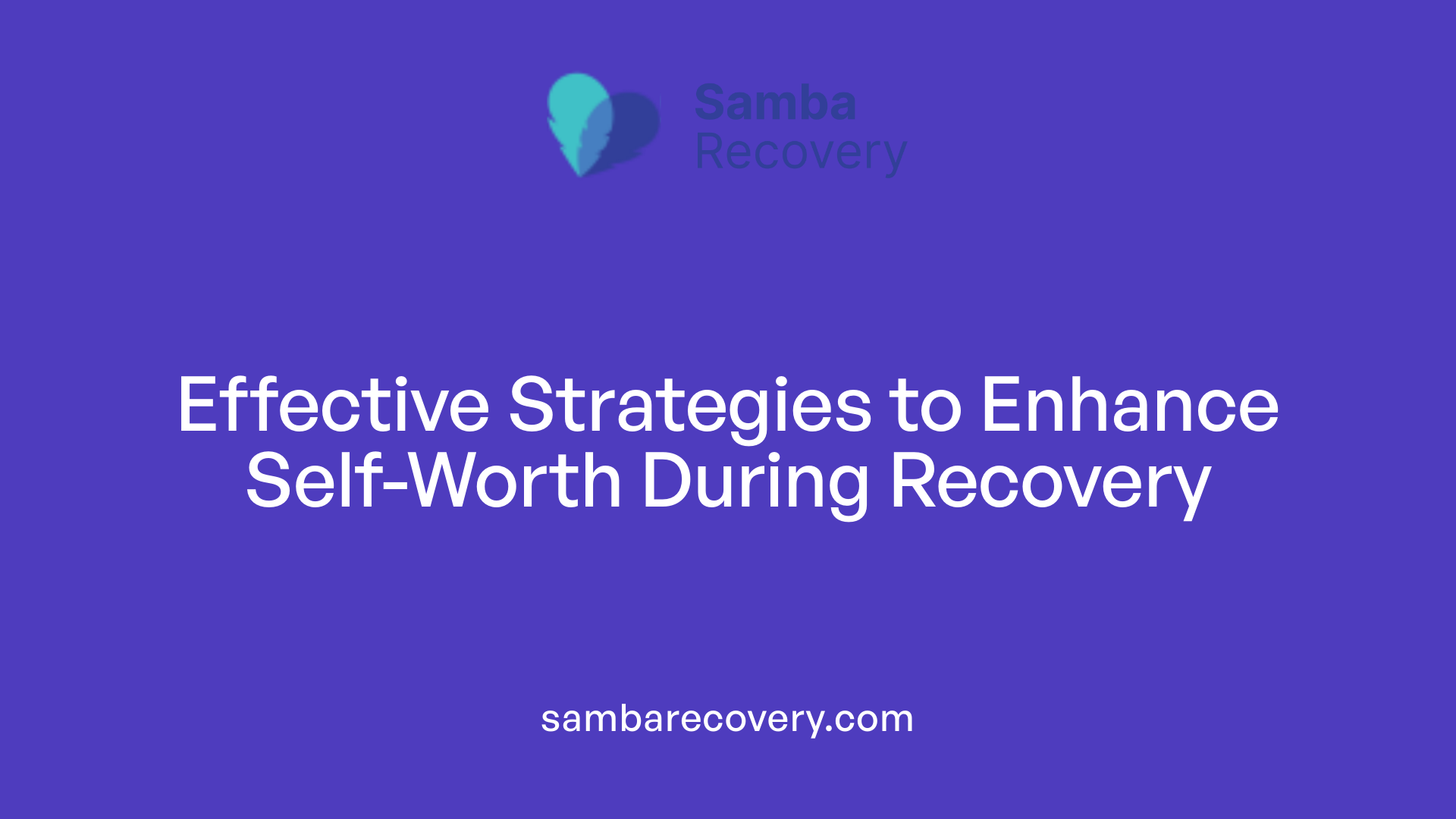
What strategies can improve self-worth in the context of addiction recovery?
Improving self-worth during addiction recovery involves several effective strategies. One fundamental approach is engaging in regular therapy, particularly cognitive-behavioral therapy (CBT). This method helps individuals identify and challenge their negative beliefs about themselves, giving them tools to rewrite their internal narratives.
Practicing self-compassion is essential as well. Avoiding harsh self-criticism and learning to forgive oneself for past mistakes can foster a healthier self-image. Self-forgiveness is crucial in breaking cycles of guilt and shame that often accompany addiction, allowing room for personal growth.
Incorporating daily rituals can also greatly benefit self-esteem. For example, reciting positive affirmations each morning can instill a sense of hope and self-worth. Additionally, maintaining a gratitude journal encourages individuals to focus on their strengths and achievements, reinforcing their value beyond past behaviors.
What role do support systems play in enhancing self-esteem?
Building a supportive network is vital. Relationships with friends, family, and peer groups provide emotional stability and reinforce positive self-perception. Engaging in prosocial behavior, such as volunteering or helping others, not only enhances self-esteem but also strengthens these crucial connections, making them integral to sustaining recovery.
What daily practices can help boost self-esteem?
Daily self-care practices are essential for enhancing self-worth. Activities like exercise, healthy eating, and adequate sleep contribute to one’s physical and mental health, establishing a foundation for improved self-image. Practicing positive self-talk further encourages resilience, allowing individuals to confront challenges with optimism.
Rebuilding Self-Esteem During Recovery
How can self-esteem be rebuilt during addiction recovery?
Rebuilding self-esteem during addiction recovery involves a comprehensive approach that integrates various effective strategies. One powerful method is Cognitive Behavioral Therapy (CBT), which aims to alter negative thought patterns and reinforce positive self-beliefs. CBT encourages individuals to practice self-forgiveness, allowing them to view their past mistakes as just that—mistakes, not definitive failures.
Daily actions also contribute significantly to self-esteem. Engaging in prosocial behavior, such as helping others or expressing kindness, can enhance one’s self-image and instill a sense of purpose. Learning to accept compliments graciously fosters gratitude and counteracts negative self-talk, which is often prevalent during recovery.
Setting achievable goals further empowers individuals. When patients reach these milestones, they experience a strong sense of accomplishment, which reinforces their self-worth. Complementing these efforts with self-care routines—including healthy eating, regular exercise, and adequate sleep—supports mental and physical well-being, vital for sustaining recovery.
Additionally, practicing positive affirmations can transform one’s self-perception. Surrounding oneself with supportive relationships provides a buffer against feelings of isolation, reinforcing the belief that recovery is possible and that individuals are worthy of love and respect. All these elements together weave a robust fabric for improving self-esteem, ultimately crucial for successful long-term recovery.
The Emotional Toll of Addiction and Recovery
What is the role of feelings of guilt and shame in addiction?
The emotional landscape of addiction is heavily influenced by guilt and shame. Individuals with substance use disorders often experience profound guilt stemming from their actions and the consequences of their substance abuse. This guilt can lead to self-blame, which perpetuates a cycle of shame that diminishes self-esteem.
Shame, in contrast to guilt, tends to be more destructive; it often leads individuals to internalize feelings of unworthiness. When shame becomes overwhelming, it solidifies negative self-perceptions and hinders the recovery process. Instead of feeling capable of change, individuals may view themselves as flawed, exacerbating their addictive behaviors.
How can emotional balance contribute to recovery?
Achieving emotional balance is crucial for individuals in recovery. Programs designed to rehabilitate individuals from addiction advocate for managing feelings of guilt and shame constructively.
A focus on guilt can sometimes be beneficial. It can prompt individuals to reflect on their actions and engage in healthier behaviors. Meanwhile, shame needs to be addressed, as it can obscure personal growth and reinforce the negative self-image that leads to relapse.
Effective recovery strategies include cognitive-behavioral therapy (CBT) to reshape negative thoughts and self-compassion practices to cultivate a healthier self-worth. Building supportive communities, participating in self-help groups, and practicing self-care contribute significantly to developing a balanced emotional state, fostering resilience and progress in recovery.
In summary, recognizing and addressing the roles of guilt and shame paves the way for improved self-esteem, influencing overall recovery outcomes positively.
Overcoming the False Self-Worth Derived from Addiction
Balancing Outer and Inner Self
Addressing the imbalance between one’s outer self (social roles) and inner self (true feelings and thoughts) is vital in recovery from addiction. Many individuals develop a false sense of self-worth fueled by experiences of addiction, where their identity is tethered to societal judgments and personal failures. This mismatch leads to a distorted self-image and feelings of shame.
In recovery, individuals are encouraged to cultivate self-awareness, allowing them to recognize and appreciate their true value beyond past behaviors. This process often involves the use of therapeutic interventions such as cognitive-behavioral therapy (CBT), which aids in reshaping negative thought patterns and bolstering self-worth.
Addressing Shame and Guilt in Recovery
Shame and guilt play critical roles in the recovery process, often exacerbating feelings of worthlessness. While guilt can be a constructive force, prompting better choices, shame tends to deepen the cycle of self-blame and low self-esteem.
To effectively manage these emotions, individuals are encouraged to adopt a nurturing perspective towards themselves. This involves practicing self-forgiveness, which relieves the burden of past mistakes and fosters a healthier self-image.
Additionally, joining support groups and engaging in prosocial acts can counteract feelings of isolation, enabling a shift from shame to empowerment. These strategies create a supportive environment that helps individuals redefine their perceptions of self-worth and embrace their capacity for change.
Embracing Positive Self-Perception in Recovery
As we unravel the complex relationship between addiction and self-worth, it becomes evident that enhancing self-esteem is not just a key component of recovery but a fundamental aspect of personal growth. By addressing the psychological impacts of addiction, combating stigma, and employing effective strategies for improving self-esteem, individuals on their recovery journey are better positioned to achieve lasting sobriety. This transformation involves cultivating a supportive network, engaging in self-reflective practices, and embracing strengths that build resilience. Ultimately, nurturing a healthy self-image fosters a renewed sense of purpose and the confidence to lead a fulfilling life beyond addiction.
References
- The Role of Self-esteem in Tendency towards Drugs, Theft and …
- Boosting Self-Esteem in Addiction Recovery
- How to Build Self-Esteem During Recovery From an Addiction
- Changing Self Perceptions During Addiction Recovery
- Self-Esteem and Addiction: How to Build it Up During Recovery
- Preventing a False Sense of Self Worth in Recovery – Lakeview Health
- How Does Addiction Affect Self-Esteem? | Virtue Recovery
- The Connection Between Self-esteem and Addiction
- How to Find Self-Worth After Addiction | Never Alone Recovery
- How Does Substance Abuse Impact Self-Confidence?






